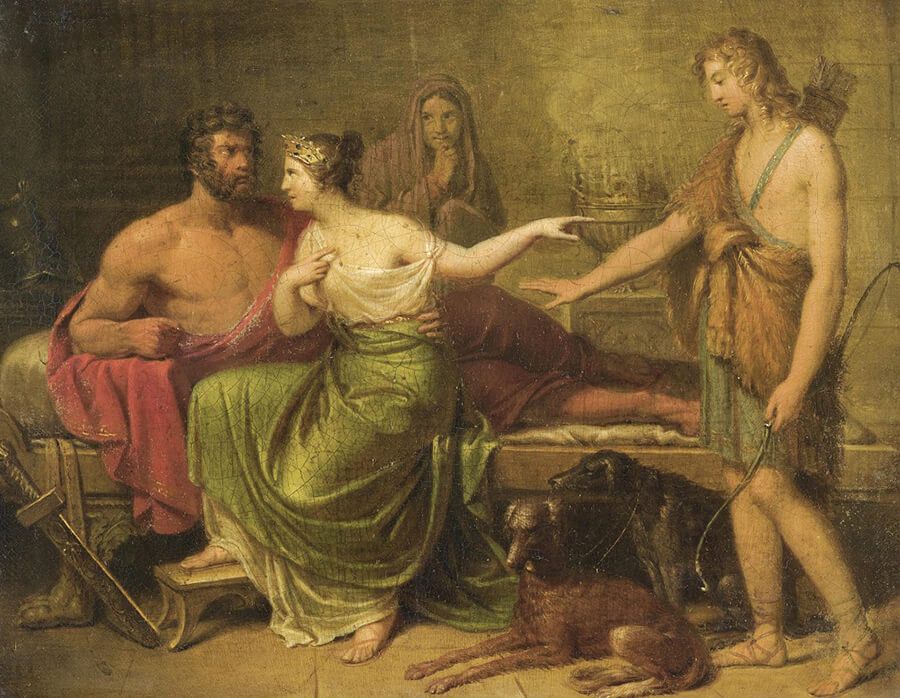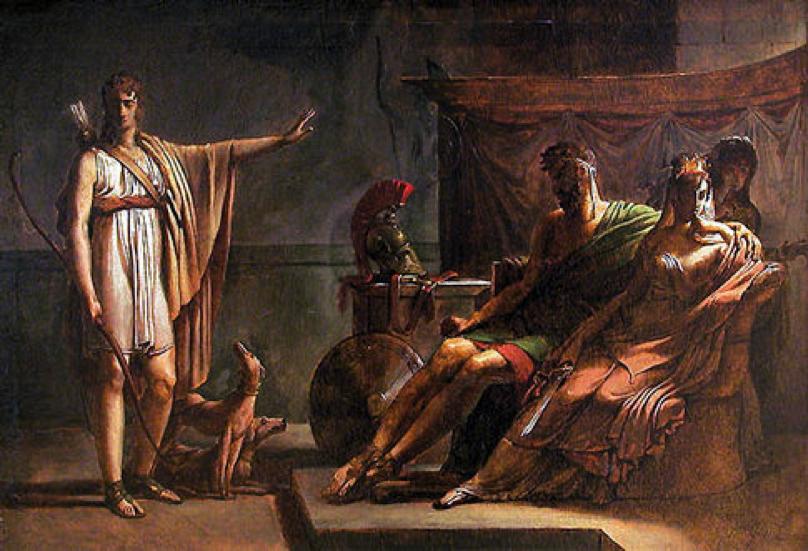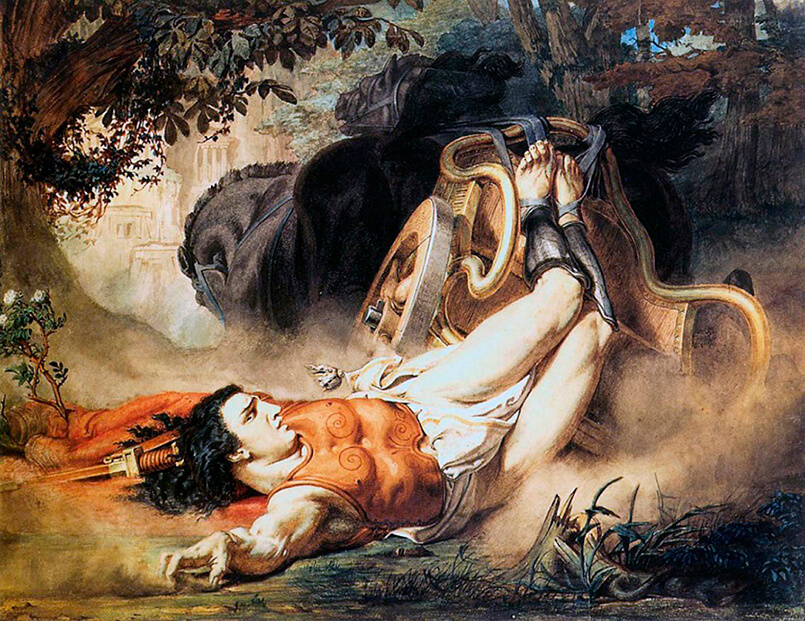Hippolytus
In Greek mythology, Hippolytus (Ancient Greek: Ἱππόλυτος) was the son of Theseus and either Antiope or Hippolyta. He was identified as the Roman forest god Virbius.
The meaning of Hippolytus' name is ironically ambiguous. It can mean "unleasher of horses" but also: Ἱππό translates to "horse", and the element -λυτος (from λύω "loosen, destroy") suggests the adjective λυτός, -ή, -όν "which may be undone, destroyed." His name thereby takes on the prophetic meaning "destroyed by horses".
Hippolytus was the son of Theseus, King of Athens, born to one of two Amazon queens, either Antiope or Hippolyta. Later, Theseus would marry Phaedra, daughter of Minos, and Hippolytus was sent away from Athens, to nearby Troezen, where he was mentored by Theseus' grandfather, Pittheus.
Hippolytus grew into a handsome man and a follower of Artemis. As a devotee of Artemis, Hippolytus decided to remain chaste, spurning all women and love. This greatly affronted Aphrodite, the Greek goddess of Love, who now sought revenge.
The most common legend regarding Hippolytus states that he was killed after rejecting the advances of Phaedra, his stepmother, the second wife of Theseus. Spurned, Phaedra deceived Theseus saying that his son had raped her. Theseus, furious, used one of the three wishes given to him by Poseidon to curse Hippolytus. Poseidon sent a sea-monster—or, alternatively, Dionysus sent a wild bull—to terrorize Hippolytus's horses, who dragged their rider to his death.
Versions of this story appear in Euripides' play Hippolytus, Seneca the Younger's play Phaedra, Ovid's Metamorphoses and Heroides, and Jean Racine's Phèdre.
Euripides' version has Phaedra's nurse tell Hippolytus of Phaedra's love. Hippolytus swore that he would not reveal the nurse as a source of information – even after Phaedra killed herself and falsely accused him of raping her in a suicide note, which Theseus read.
Alternatively, it is stated that Phaedra simply killed herself out of guilt for Hippolytus’ death and that the goddess Artemis subsequently told Theseus the truth.
According to some sources, Hippolytus had scorned Aphrodite in order to become a devotee of Artemis, devoting himself to a chaste life in pursuit of hunting. In retaliation, Aphrodite made Phaedra fall in love with him. Hippolytus’ rejection of Phaedra led to his death in a fall from a chariot.
As a result, a cult grew up around Hippolytus, associated with the cult of Aphrodite. His cult believed that Artemis asked Asclepius to resurrect the young man since he had vowed chastity to her.
He was brought to Latium, Italy, where he reigned under the name of Virbius or Virbio. After his resurrection, he married Aricia. According to another tradition, he lived in the sacred forests near Aricia in Latium. Girls who were about to be married offered locks of their hair to him as a sign of their virginity.

HIPPOLYTUS – EURIPIDES
Introduction
"Hippolytus" is a tragedy by the ancient Greek playwright Euripides, first produced at the Athens City Dionysia in 428 BCE, where it won first prize (as part of a trilogy). It is based on the myth of Hippolytus, son of Theseus, and how a series of misunderstandings and the meddling of the gods result in his death and that of his step-mother, Phaedra.
Synopsis
The play is set in Troezen, a coastal town in the northeastern Peloponnese, where King Theseus of Athens is serving a year’s voluntary exile after having murdered a local king and his sons. Hippolytus, Theseus‘ illegitimate son with the Amazon Hippolyta, has lived and trained in Troezen since his early childhood, under the protection of Pittheus, the king of Troezen.
At the start of the play, Aphrodite, the goddess of love, explains that Hippolytus has sworn a vow of chastity and now refuses to revere her, instead honouring Artemis, the chaste goddess of the hunt. Hippolytus is warned about his overt disdain for Aphrodite, but he refuses to listen. As an act of vengeance for Hippolytus‘ snub, Aphrodite has caused Phaedra, Theseus‘ wife and Hippolytus‘ stepmother, to fall madly in love with him.
The Chorus of young married women of Troezen describe how Phaedra is not eating or sleeping, and Phaedra finally shocks the Chorus and her nurse by reluctantly admitting that she is sick with love for Hippolytus, and that she plans to starve herself in order to die with her honour intact.
The nurse soon recovers from her shock, though, and urges Phaedra to give in to her love and live, telling Phaedra that she knows of a medicine which will cure her. Instead, however, the nurse runs to tell Hippolytus of Phaedra‘s desire (against Phaedra‘s express wishes, even if done out of love for her), making him swear an oath that he will not tell anyone else. He reacts with a furious, misogynistic tirade on the poisonous nature of women
Since the secret is out, Phaedra believes she is ruined and, after making the Chorus swear secrecy, she goes inside and hangs herself. Theseus then returns and discovers his wife’s dead body, along with a letter which seems to clearly place the blame for her death on Hippolytus. Misinterpreting this to mean that Hippolytus had raped Phaedra, the enraged Theseus curses his son to death or at least exile, calling on his father Poseidon to enforce the curse. Hippolytus protests his innocence, but cannot tell the whole truth because of the binding oath he previously swore to the nurse. As the Chorus sings a lament, Hippolytus goes off into exile.
However, a messenger appears shortly to report how, as Hippolytus got into his chariot to leave the kingdom, a sea-monster sent by Poseidon (at Aphrodites’ request) frightened his horses and dragged Hippolytus along the rocks. Hippolytus lies dying, but Theseus still refuses to believe the messenger’s protests that Hippolytus was innocent, revelling in Hippolytus‘ suffering.
Artemis then appears and tells him the truth, explaining that his son was innocent and that it was the dead Phaedra who had lied, although she also explains that the ultimate blame must lie with Aphrodite. As Hippolytus is carried in, barely alive, Artemis vows revenge on Aphrodite, promising to kill any man that Aphrodite holds dearest in the world. With his final breaths, Hippolytus absolves his father of his death, and finally dies.
HIPPOLYTUS - THE GIANT
Hippolytus (the giant) was one amongst the Giants that fought against the Olympian Gods during the Gigantomachy.
He was killed by either goddess Athena together with Hercules or by some Olympian Gods by joining forces with Hercules.

Sources
Hippolytus – Euripides (Ευριπίδης - Ιππόλυτος)
Aeneid - Virgil
"Wikipedia"
"Ancient Literature"













